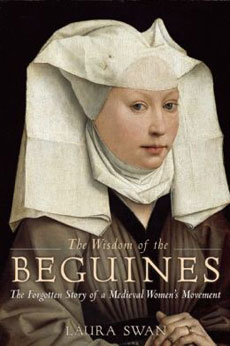Laura Swan has for many years studied and written about the history of women's spirituality and the monastic life. She is the associate editor of Magistra: A Journal of Women's Spirituality in History and adjunct professor of religious studies at Saint Martin's University in Washington State. She is the author of The Forgotten Desert Mothers.
The Beguines began to band together as laywomen in the year 1200, choosing not to live in monasteries. They lived alone or in walled-in rows of houses. According to Swan, these women were known for their visionary spirituality, their knack for business, and their service of the poor and the sick.
With no founder, no single leader, and no rule of life, the Beguine movement democratized spirituality. Four great writers and mystics came from this tradition: Mechthild of Magdeburg, Beatrijs of Nazareth, Hadewijch, and Marguerite Porete. The last was condemned as a heretic and burned at the stake in 1310. But the vibrant legacy of the Beguines lives on:
"Beguines showed great strength and persistence and collaborated with fellow seekers, tolerated diversity, and raised difficult questions; they exercised both communal and personal wisdom and freedom to follow God as they felt called . . . Their voices proclaim a divine presence that yearns for relationship with each of us. These medieval women offer us hope and a fresh path: to think creatively, to collaborate to achieve change, and to live with prophetic courage."
